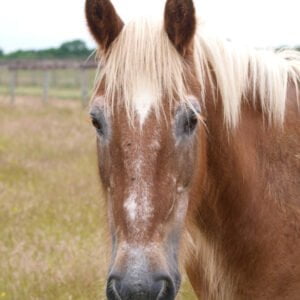Are you trying to feed a toothless horse and running into issues?
Horses who cannot chew their food often miss the essential nutrients to keep them healthy. If you have a dentally impaired or senior horse, you must adjust their feeding and management to ensure they get and absorb nutrients. We’ve covered some tips on feeding the toothless horse.
What is a toothless horse?
When a horse is labeled toothless, it doesn’t necessarily mean they have no teeth. It means they have an impaired ability to chew their food due to several missing teeth. Horses can be missing teeth for many reasons, including cysts or tumors in the horse’s head requiring tooth removal, cracked or infected teeth, and age.
Horses have hypsodont teeth, meaning they are tall and erupt continuously from the gum. The chewing process grinds teeth down, so over time, it’s possible to “run out of teeth.” Adult teeth are about 4 inches, so as your horse ages, it will likely lose its teeth.
Best Feeding Practices for Toothless Horses
 Regardless of the number of teeth your horse is missing, it’s essential to know how this impairs chewing and digestion. Horses are foragers, so they need fiber for healthy function. Unfortunately, forage can be difficult for toothless horses.
Regardless of the number of teeth your horse is missing, it’s essential to know how this impairs chewing and digestion. Horses are foragers, so they need fiber for healthy function. Unfortunately, forage can be difficult for toothless horses.
Horses missing their incisors (front teeth) will have difficulty grazing on short or overgrazed pasture. However, if your horse is missing molars, it will have trouble grinding its feed. Not being able to grind down hay or grain properly means they are more predisposed to choking.
Feeding Grass and Hay
Toothless horses should have free access to pasture or hay. Due to the choking risk, horses with missing molars should not have access to long-stemmed hay or pasture. You can feed hay cubes, pellets, chopped forage, or beat pulp to supplement the missing fiber in their diet.
Feeding Grain
Grain, pellets, and complete feed are excellent options to improve weight, health, and coat condition for horses with missing teeth. Complete feeds are generally recommended for senior horses with missing teeth because it meets all the nutritional requirements without hay or pasture. They are easy to digest and contain high fiber. Remember to always consult your veterinarian before switching your horse’s feed.
Dividing Meals
You can make several simple management changes to help a toothless horse. Dividing feed into smaller and more frequent meals can reduce gastric ulcers and digestive upsets.
Feeding Softer Food
Complete feeds are often relatively soft because this reduces chewing at each meal. Feeding softer grains and treats will make it much easier for your horse to chew. Dimples Horse Treats are soft enough for toothless horses to eat easily without discomfort.
If you feed “harder” grains, you can soak them in water to soften them. You can soak both hay and grain in water to break them down. If you are soaking grain, cover it and not soak it for a short period. More extended soaking can lead to bacteria and attracts insects and rodents.
Find a Dimples® Horse Treats Retailer HERE.

Pingback: How to Feed the Toothless Horse | Dimples Horse...